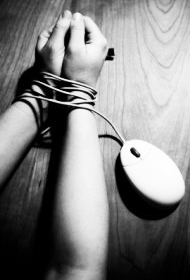Internet addiction a real health issue

 In the early stages of Internet or technology addiction, neurotransmitters in the brain begin overloading the body with dopamine. Dopamine is the chemical hormone that controls roles in behavior and cognition.
In the early stages of Internet or technology addiction, neurotransmitters in the brain begin overloading the body with dopamine. Dopamine is the chemical hormone that controls roles in behavior and cognition.
The prefrontal cortex and VTA areas of the brain are stimulated by the excess of dopamine and soon, a dependency on the overload is needed for a person to function.
More than 20 students gathered on April 17 in CU1 to listen to Dr. Peter John A. Messiah give a dynamic and engaging lecture about Internet addiction.
Messiah, an addiction prevention specialist and professor at Oklahoma City University, described the way that too much Internet can lead to addiction and the consequences this kind of addiction may reap for a person’s health.
“Techno-addicts” as Messiah calls them, are people who suffer from an addiction to technology, whether it be the Internet, cellphones, or online or console gaming.
He said, in 2011, “Internet Addicted Disorder” was finally added to the DSM. The DSM, or Diagnostic and Statistical Manual of Mental Disorders, is used by physicians in the diagnosis and treatment of mental health disorders.
Messiah shared his own story, revealing that he, too, was once dangerously close to being a techno-addict.
Like many addicts, Messiah’s dependency on technology soon began to take away from his quality of life.
“For me, it was my e-mail,” Messiah said. “I felt like I needed to be constantly connected.”
He said the demands of his dependency began to take a toll on his health and it was for that reason he began to strictly monitor his online presence.
Messiah said Internet dependency and techno-addiction can lead to problems within interpersonal relationships — going so far as interfering with a person’s professional life and health.
Carpal tunnel syndrome, dry eyes, back and neck ache, eating irregularities, exercise disruption and even sleep disorders are among the health troubles he said technology addiction can lead to.
Messiah said there are indicators of dependency just as with alcohol or drug addiction.
He said there may be a problem “when you begin losing track of time online, becoming irritated or cranky when online time is disrupted.”
But it’s easy, Messiah said, to monitor this and make time spent online both healthy and productive.
“Set perimeters. Say I’m going to go online and I’m going to work for x amount of time.
“Do work stuff at work so that it doesn’t bleed over and you can truly examine what you’re doing online on your personal time.”
Messiah said the next step to curing the techno-addict is to get it classified as a more serious mental disorder so that the treatment for it will reflect as much.
While he did caution that anyone can fall victim to technology addiction, Messiah said those willing to admit they may have a problem and do things to correct it, are capable of helping themselves without giving up the Internet or technology altogether.
“We need to talk about balance. “I’m not one of those people that says Facebook is evil or that the Internet is evil,” Messiah said. “I think the Internet serves a good purpose. Do whatever makes you happy but do it in moderation.”
According to OCU’s Facebook page at www.facebook.com/okcuaddictionpreventionstudies,“Oklahoma City University … appointed Dr. Peter John A. Messiah to lead its … Addiction Prevention Studies program.
The … program at OCU was started by a donation from Jack Turner, who served on two governor’s task forces regarding addiction and on the board for the Oklahoma Department of Mental Health and Substance Abuse Service. Turner cited findings of a study conducted for the most recent Governor’s Task Force showing … more than 6,500 students in Oklahoma colleges and universities drop out … because of problems related to alcohol addiction and abuse.